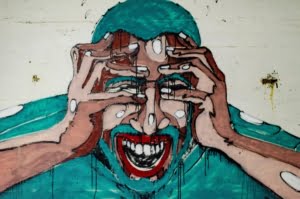Understanding anxiety can be complex, but it does not have to be. Almost 40 million adults in the United States report feeling overwhelmed or disabled in daily activities. One-in-five over age eighteen, and one-in-three ages thirteen to eighteen report having chronic anxiety.
 Anxiety can be a persistent, seemingly uncontrollable, or an irrational cluster of symptoms but it does not have to be. Understanding symptoms, causes, and treatments may help you to gain control of distressing symptoms. I hope this article helps you understand your options to determine your best course of action. San Diego Christian Counseling can support you in this journey.
Anxiety can be a persistent, seemingly uncontrollable, or an irrational cluster of symptoms but it does not have to be. Understanding symptoms, causes, and treatments may help you to gain control of distressing symptoms. I hope this article helps you understand your options to determine your best course of action. San Diego Christian Counseling can support you in this journey.
Anxiety is among the most common mental illnesses. It accompanies many situations and diagnoses. It can develop from uncontrollable factors, have emotional elements, scientific explanations, and testimonies of feeling alone, isolated, and scared. Some report knowing their options but struggling to do anything about them.
This article will explore evaluation, treatment, and evidence not limited to cognitive behavioral treatment and pharmacotherapy. There are many treatments, including talk therapy, exercise, stress reduction, goal setting, meditation, and Positive Psychology. The desire is that you determine what works best for you.
Below is a general description of anxiety. Do any of these symptoms describe you?
What is Anxiety?
Anxiety is a sense of uneasiness, distress, concern, apprehension or unease typically related to an unknown outcome. Anxiety may have physiological and psychological signs or symptoms. A rapid heart rate, sweating or chills, and trouble breathing can make it hard to differentiate the mind from the body.
The intensity of many symptoms will decrease if you are removed from a stressful environment. While some anxiety can help prepare the body to be alert and aware it can also be debilitating or making one less motivated to do what one wants to do.
Symptoms of Anxiety
- Significant emotional or marked fear that feels difficult to control
- Restlessness
- Proneness to fatigue
- Difficulty concentrating
- Muscle tension
- Difficulty falling or staying asleep
- If you have another medical condition where the symptoms are not better explained by panic disorder, social phobia, obsessive-compulsive disorder, separation from attachment figures, post-traumatic stress, anorexia nervosa, somatic symptom disorder, body dysmorphic disorder, delusional beliefs or the physiological effects of a substance.
If you do not know what I am talking about, do not worry. Talk to your provider to learn more.
How Might I Treat Anxiety?
 There is no single ‘best’ treatment that works for everyone. The key is knowing your options so you can determine your best next step.
There is no single ‘best’ treatment that works for everyone. The key is knowing your options so you can determine your best next step.
Cognitive Behavioral Therapy
Cognitive Behavioral Therapy or CBT is a theoretical orientation. CBT is evidence based and focuses on identifying, understanding, and possibly changing thoughts, feelings, and/or behaviors. Coping skills, thought records, identifying cognitive distortions, and exposure therapy are common interventions.
Dialectical Behavioral Therapy or DBT is a type of CBT that explores acceptance, contradictory ideas, and change with an emphasis on mindfulness. Books are dedicated to CBT, DBT, and mindfulness so it is safe to say I have only scratched the surface.
Group Therapy
Some prefer group therapy to share experiences and offer advice. “Group Therapy” could be a social, educational, or process oriented. A social group may encourage relationships between those with similar experiences. An educational group may support advice and resources.
A process-oriented group is often facilitated by a psychologist or psychotherapist. Sometimes a process-oriented group includes those with different experiences and diagnosis. Again, there are books dedicated to forms of therapy.
Hypnosis / Mindfulness / Meditation
 Though these get grouped together for several reasons, they are actually different concepts. Meditation is about focusing your thoughts. Mindfulness keeps your thoughts focused. This is one reason many see mindfulness connected to meditation but what is important with both of them is noticing your own experience such as acknowledging muscle tension and breathing patterns.
Though these get grouped together for several reasons, they are actually different concepts. Meditation is about focusing your thoughts. Mindfulness keeps your thoughts focused. This is one reason many see mindfulness connected to meditation but what is important with both of them is noticing your own experience such as acknowledging muscle tension and breathing patterns.
Progressive Muscle Relaxation and Square Breathing are two common concepts you may find helpful. Some report positive results from hypnotherapy and like other concepts mentioned in this article, there really is an abundance of resources. Please consult your provider to learn more.
Medication
The medications below require a prescription. Some Primary Care physicians will prescribe but many will refer to a psychiatrist. Selective Serotonin Reuptake Inhibitors (SSRIs) and Serotonin-Norepinephrine Reuptake Inhibitors (SNRIs) are two classes of antidepressants that are believed to help with anxiety.
Serotonin is a neurotransmitter that plays a role in mood regulation. SNRIs increase serotonin and norepinephrine (a stress hormone). There has been a lot written about SSRIs and SNRIs and of course, you are encouraged to consult your prescribing provider.
Benzodiazepines work on the neurotransmitter GABA (gamma-aminobutyric acid). GABA aids with sleep, relaxation, anxiety, mood and memory. Benzodiazepines are less popular due to the abuse of the medication and their addictive properties. Beta Blockers and other drugs may be prescribed. Ketamine has been receiving recent interest. Please consult your prescribing provider to learn more.
Stimulation Therapies
TMS or repetitive transcranial magnetic stimulation delivers a magnetic pulse to the brain via an electrode. Deep Brain Stimulation or DBS is the implanting of an electrode in the brain. Transcranial electrical stimulation and electroconvulsive therapy are additional therapies you may read about. Brain stimulation therapies are not considered first-line treatments and most are not recognized by insurance.
Nutrition
We have all read about the association between what you eat and how you feel. Some research speaks to emotional eating. Other research suggests nutrient deficiencies that could contribute to your anxiety. Zinc, vitamins D, B12, B6, E, omega 3 polyunsaturated fatty acids, sugar, salt, hydration, and magnesium are some deficiencies written about in the literature. Your doctor will likely order a blood panel is a deficiency is suspected.
Exercise
 When you exercise you release hormones that improve your mood. Some physical activity can help you calm down, relax, release muscle tension, improve concentration, or “feel” good. Exercise can change serotonin, GABA, and executive functioning alongside other physiological benefits.
When you exercise you release hormones that improve your mood. Some physical activity can help you calm down, relax, release muscle tension, improve concentration, or “feel” good. Exercise can change serotonin, GABA, and executive functioning alongside other physiological benefits.
While most of us know the many benefits of exercise we often forget the mood benefits and for some, we may know that we want to be physically active but anxiety can make initiating activity difficult. I think the most important initial step is to select an activity that is reasonable and attainable.
Faith
From a Christian perspective, forgiveness, acceptance, forgetting, and being self-critical are not difficult to assess. Religious, spiritual, and faith-based beliefs, ideas, understanding, and symptoms are an important component to address. Counselors at San Diego Christian Counseling can help with these aspects.
Summary
No matter the signs or symptoms of anxiety you experience or the chosen route towards comfort one common suggestion is to have a plan. Set specific, measurable, attainable, reasonable, goals with daily, weekly, and monthly timelines. Make an effort to address your symptoms and start somewhere.
“Inside Looking Out”, Courtesy of Sasha Freemind, Unsplash.com, CC0 License; “Breakdown”, Courtesy of Aaron Blanco Tejedor, Unsplash.com, CC0 License; “Praying”, Courtesy of Marquise Kamanke, Unsplash.com, CC0 License; “…and breathe…”, Courtesy of Max van den Oetelaar, Unsplash.com, CC0 License


